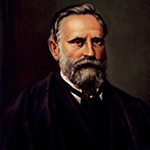
Stanley Matthews (1881-1889)
Thomas Stanley Matthews lived from 1824 to 1889.
Early Life and Legal Career
Matthews was born in Cincinnati, Ohio. He enrolled in Kenyon College as a junior and graduated at age sixteen. Matthews read law in Ohio prior to moving to Tennessee, where he was admitted to the bar at age eighteen. After practicing in Tennessee for five years, Matthews returned to Ohio where he became an editor for the Cincinnati Herald, a local newspaper. He held several public service offices, including clerk of the Ohio House of Representatives and county judge in Hamilton County. After being elected to the Ohio State Senate for the first district, where he served from 1856 to 1858, Matthews was appointed as the U.S. Attorney for the Southern District of Ohio.
He served as U.S. Attorney from 1858 to 1861, before resigning to serve as a lieutenant colonel with the 23rd Ohio Infantry Regiment of the Union Army during the Civil War. In 1861, Matthews was appointed colonel of the 51st Ohio Infantry Regiment. As colonel, Matthews led a brigade in the Army of the Ohio and the Army of the Cumberland before resigning in 1863.
In 1876, Matthews ran for the United States House of Representatives, but was unsuccessful. One year later, he won a special election to the Senate, filling a vacancy created by the resignation of John Sherman. However, he did not seek reelection.
Appointment to the Supreme Court
President Rutherford B. Hayes nominated Matthews for a position as an Associate Justice on the Supreme Court on January 26, 1881. Matthews was a controversial nominee, as the senate believed that the President nominated Matthews due to their history as classmates at Kenyon College. The nomination came at the end of President Hayes’ term, so the Senate did not act on it. Shortly after, President James A. Garfield succeeded Hayes and renominated Matthews in March 1881. The Senate confirmed him by a 24 to 23 vote, the narrowest confirmation for a successful Supreme Court nominee in history.
Matthews penned the unanimous opinion in Yick Wo v. Hopkins (1886). In Yick Wo, the Court struck down a San Francisco ordinance stating that a laundry could not be operated in a wooden building without a permit from the Board of Supervisors. The ordinance was very clearly an attempt to discriminate against the Chinese population of San Francisco, as approximately two-thirds of laundries in the city were owned by Chinese persons. In his opinion, Matthews found that the ordinance discriminated against Chinese persons and, even though some of the laundry owners in this case were not American citizens, they were still protected by the equal protection clause of the Fourteenth Amendment. Matthews served on the Court until his death, a tenure that lasted eight years.
Death
Matthews died on March 22, 1889 at the age of 64. He is buried in Spring Grove Cemetery in Cincinnati, Ohio.
Notable Cases
Yick Wo v. Hopkins (1886)







